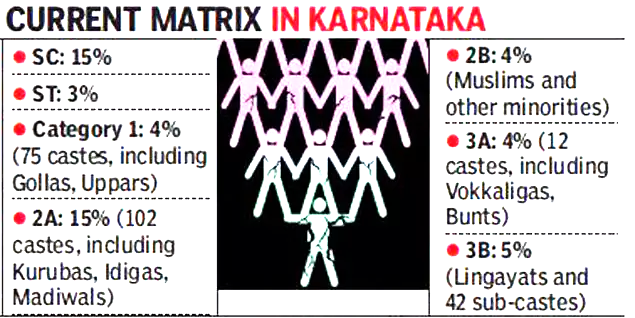Indian Polity
Kuruba Community: Karnataka
- 09 Feb 2021
- 4 min read
Why in News
A massive rally was organised by the Kuruba community to urge the state government of Karnataka to recommend the Centre inclusion of the community in the Scheduled Tribe (ST) list.
Key Points
- Background:
- From Independence, the community enjoyed the ST status. In 1977, Justice LG Havanur, who headed the backward class commission, moved the Kurubas to the ‘most backward classes’ category from ST list.
- However, the Commission brought in an area restriction stating that those living in Bidar, Yadgir, Kalaburagi and Madikeri with Kuruba synonyms can continue to avail the ST benefits.
- About Kurubas:
- The Kurubas of Karnataka are a traditional sheep rearing community.
- Presently, the Kurubas constitute 9.3% of the state’s population and come under the backward classes category.
- Kurubas are the fourth largest caste in Karnataka after the Lingayats, Vokkaligas and Muslims.
- Kurubas in other states are known by different names – as Dhangars in Maharashtra, Rabaris or Raikas in Gujarat, Dewasis in Rajasthan and Gadarias in Haryana.
- Related Developments:
- Demands by Lingayat Community: Three years earlier, the Lingayat community demanded a separate minority religion tag in Karnataka.
- The Lingayat sub-sect Panchamasali has also demanded its inclusion in the 2A category of backward classes - which currently provides 15% reservations to backward castes.
- Justice HN Nagamohan Das Commission:
- The Justice HN Nagamohan Das Commission was constituted to look into increasing the existing reservation for SCs from 15% to 17% and for the STs from 3% to 7% by not exceeding the overall 50% reservation quota as mandated by the Supreme Court's order of 1992.
- If Kurubas are to be declared ST as per their demand, the quota for STs will have to be proportionally increased.
- The Justice HN Nagamohan Das Commission was constituted to look into increasing the existing reservation for SCs from 15% to 17% and for the STs from 3% to 7% by not exceeding the overall 50% reservation quota as mandated by the Supreme Court's order of 1992.
- Challenge:
- The larger issue is that the State has already hit the apex court set 50% cap on reservation and any hike poses a challenge.
- Demands by Lingayat Community: Three years earlier, the Lingayat community demanded a separate minority religion tag in Karnataka.
- Present Reservation Quota in Karnataka:
- Adhering to the Supreme Court’s 1992 order, Karnataka has capped the reservation to 50% where 32% has been earmarked for backward classes, including Muslims, Christians and Jains, 15% for SCs and 3% for STs.
- This reservation quota has been further pared into categories: Category 1 (4%), Category 2A (15%), Category 2B (4%), Category 3A (4%), Category 3B (5%), SC (15%) and ST (3%).
Scheduled Tribe
- About
- Article 366 (25) of the Constitution refers to Scheduled Tribes as those communities, who are scheduled in accordance with Article 342 of the Constitution.
- Article 342 says that only those communities who have been declared as such by the President through an initial public notification or through a subsequent amending Act of Parliament will be considered to be Scheduled Tribes.
- The list of Scheduled Tribes is State/UT specific and a community declared as a Scheduled Tribe in a State need not be so in another State.
- Essential Characteristics:
- The Constitution is silent about the criteria for specification of a community as a Scheduled Tribe. However, following are the traits that distinguish Scheduled Tribe communities from other communities.
- Primitiveness,
- Geographical isolation,
- Shyness, and
- Social, educational and economic backwardness.
- The Constitution is silent about the criteria for specification of a community as a Scheduled Tribe. However, following are the traits that distinguish Scheduled Tribe communities from other communities.
- Particularly Vulnerable Tribal Groups:
- There are certain Scheduled Tribes, 75 in number known as Particularly Vulnerable Tribal Groups (PVTGs), who are characterised by;
- Pre-agriculture level of technology,
- Stagnant or declining population,
- Extremely low literacy, and
- Subsistence level of economy.
- There are certain Scheduled Tribes, 75 in number known as Particularly Vulnerable Tribal Groups (PVTGs), who are characterised by;







